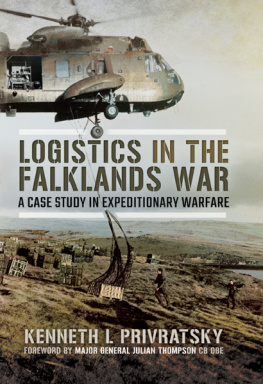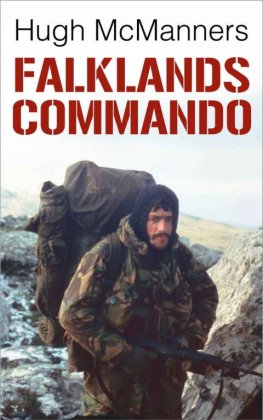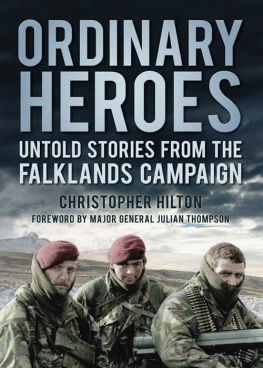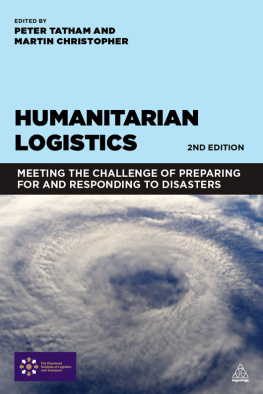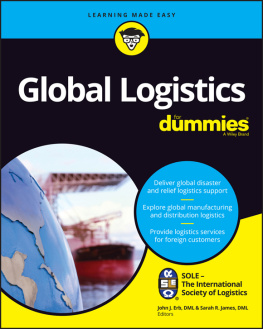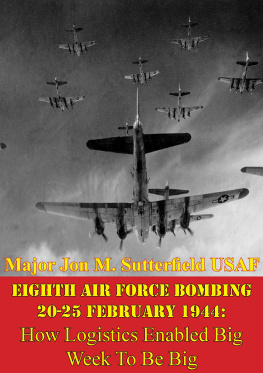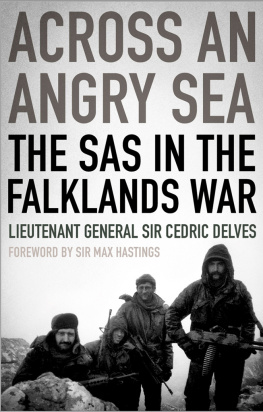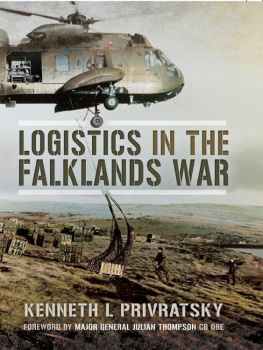
For the thousands of British men and women who worked tirelessly behind the scenes and enabled victory in the Falkland Islands War.
First published in Great Britain in 2014 and reprinted in 2016 by
Pen & Sword Military
an imprint of
Pen & Sword Books Ltd
47 Church Street
Barnsley
South Yorkshire
S70 2AS
Copyright Kenneth L. Privratsky, 2014, 2016
HB ISBN 978-1-47382-312-9
TPB ISBN 978-1-47389-904-9
EPUB ISBN 978-1-47384-308-0
PRC ISBN 978-1-47384-327-1
PDF ISBN 978-1-47384-346-2
The right of Kenneth L. Privratsky to be identified as the Author of this Work has been asserted by him in accordance with the Copyright, Designs and Patents Act 1988.
A CIP catalogue record for this book is available from the British Library
All rights reserved. No part of this book may be reproduced or transmitted in any form or by any means, electronic or mechanical including photocopying, recording or by any information storage and retrieval system, without permission from the Publisher in writing.
Typeset in Ehrhardt by
Mac Style Ltd, Bridlington, East Yorkshire
Printed and bound in the UK by CPI Group (UK) Ltd,
Croydon, CRO 4YY
Pen & Sword Books Ltd incorporates the imprints of Pen & Sword Archaeology, Atlas, Aviation, Battleground, Discovery, Family History, History, Maritime, Military, Naval, Politics, Railways, Select, Transport, True Crime, and Fiction, Frontline Books, Leo Cooper, Praetorian Press, Seaforth Publishing and Wharncliffe.
For a complete list of Pen & Sword titles please contact
PEN & SWORD BOOKS LIMITED
47 Church Street, Barnsley, South Yorkshire, S70 2AS, England
E-mail:
Website: www.pen-and-sword.co.uk
Contents
Foreword
T his is the first book devoted to addressing the logistics of the Falklands War of 1982. Perhaps we should not be surprised that it has taken thirty-two years for it to see the light of day. For as the American author Thorpe wrote, surely one of the strangest things in Military History is the almost complete silence upon the problems of supply. Yet almost every general who knows his business recognises this. During the last war eighty per cent of our problems were of a logistical nature, Montgomery is alleged to have said. Even Napoleon who dismissively pronounced, let no one speak to me of provisions, usually got it right, although lack of attention to logistics in Russia and Spain contributed to his downfall.
Here, at last, is a comprehensive account of the logistics of the Falklands War, from the British point of view, written by a highly experienced American general officer. Ken Privratsky has studied the subject deeply, starting in the 1980s. Among his many perceptive observations two stand out for me, as a senior commander in the Falklands. First his recognition, based on personal reconnaissance, that the terrain in the Falklands shaped and impinged on the way the ground forces received, or in some cases did not receive, their supplies. Second, that the operation was conducted by the British over a very long distance from their home base as the crow flies nearly 2,000 miles further from the UK than Japan with one staging post approximately half way down the route.
No one who has not visited the Falklands, be he Government Minister, Serviceman, Whitehall Official, MP or journalist, can ever speak or write convincingly about them with any sense of conviction or degree of credibility, wrote Major General Edward Fursdon, the Defence Correspondent of the Daily Telegraph, after a visit a few months after the war. This belief is echoed by Ken Privratsky, who writes, I have had the opportunity to visit the Falkland Islands twice in recent years, including a stop in South Georgia. I am not sure that anyone can provide an adequate account of the Falklands War without spending some time on the islands.
Those of us fighting in the Falklands in 1982, Navy, Marine, or Army, soon realised that the staff of the Task Force Commander (CTF), directing the war from a bunker in Northwood, just north of London, had absolutely no idea of the scale of the logistic challenge posed by operating in a land of rocky whale-backed hills and peat bog with no roads, or even the most rudimentary track. Major General Jeremy Moore originally provided the land force advice to the CTF. The day before we landed, Moore, accompanied by most of his staff, left the CTFs headquarters and travelling south in the liner Queen Elizabeth II, arrived ten days later to take command ashore. The commander and staff of Headquarters North-East District replaced him at Northwood. The majority of these people seemed unable to make the mental switch from driving about the north German plain in armoured personnel carriers accompanied by selfpropelled artillery to picturing the realities of footslogging across a peat bog. Traversing the formidable terrain was of course only a minor part of the problem facing us. The logisticians had the far greater challenge of lifting forward every bean, bullet, gun, and gallon of fuel by a combination of landing craft and a lamentably small helicopter force. Before this there was the naval logistic problem of an offload of supplies and equipment under frequent air attack.
The author also alludes to the problems inherent in conducting operations at a long distance from the home base, and furthermore that this included that most difficult of war fighting pastimes, an amphibious operation. He makes it plain that this is very different from a sea-transported operation the distinction, operationally and logistically, is sometimes lost on the present generation of British politicians, officials, and the many senior serving officers lacking even rudimentary training in the art, or even a passing acquaintance gained by reading history, let alone actual experience of amphibious operations. With the exception of the insertion of the UKs Special Boat Service into Afghanistan in 2001 by helicopter, and the 2003 invasion of Iraq, the British experience of overseas expeditions since the Falklands has been of red carpet operations, the classic example being the lead-up to the 1991 war in Kuwait, where a host nation, Saudi Arabia (and other Gulf states), provided all the facilities needed by the Coalition forces: including docks, slipways, airfields, roads, fuel, and even five star hotels for the RAF aircrew. The Falklands war involved a quintessential amphibious operation where you have to take everything you need with you, or capture it after arrival for example a port, or an airfield should these even exist. If, as in the case of the Falklands, the objective for the amphibious assault is beyond the range of land-based air, you need aircraft carriers to provide air cover and close air support; as well as carriers dedicated to bring support helicopters in far greater numbers than were made available to the amphibious and landing forces in the Falklands War.
Another aspect of an amphibious operation, which the author makes clear in this book, is that it is a joint operation in a way and to a degree that a sea-transported or straight land or maritime operation is not. In a sea-transported operation, as in the positioning of forces for Gulf War One in 1991, those being transported (the land force) are to all intents and purposes passengers and have a limited need to plan and interact with their transporters; the Royal and Merchant Navy. They do not have to think; the movement staff will tell them what to do on arrival. It is a movement operation. That is not to say that it does not require a great deal of logistic planning, but in essence it is little different from taking passengers, vehicles, and containers across the North Sea or any other stretch of water in peacetime. Those being transported do not have to take account of the myriad factors that have to be weighed up by their transporters to the degree that the
Next page
